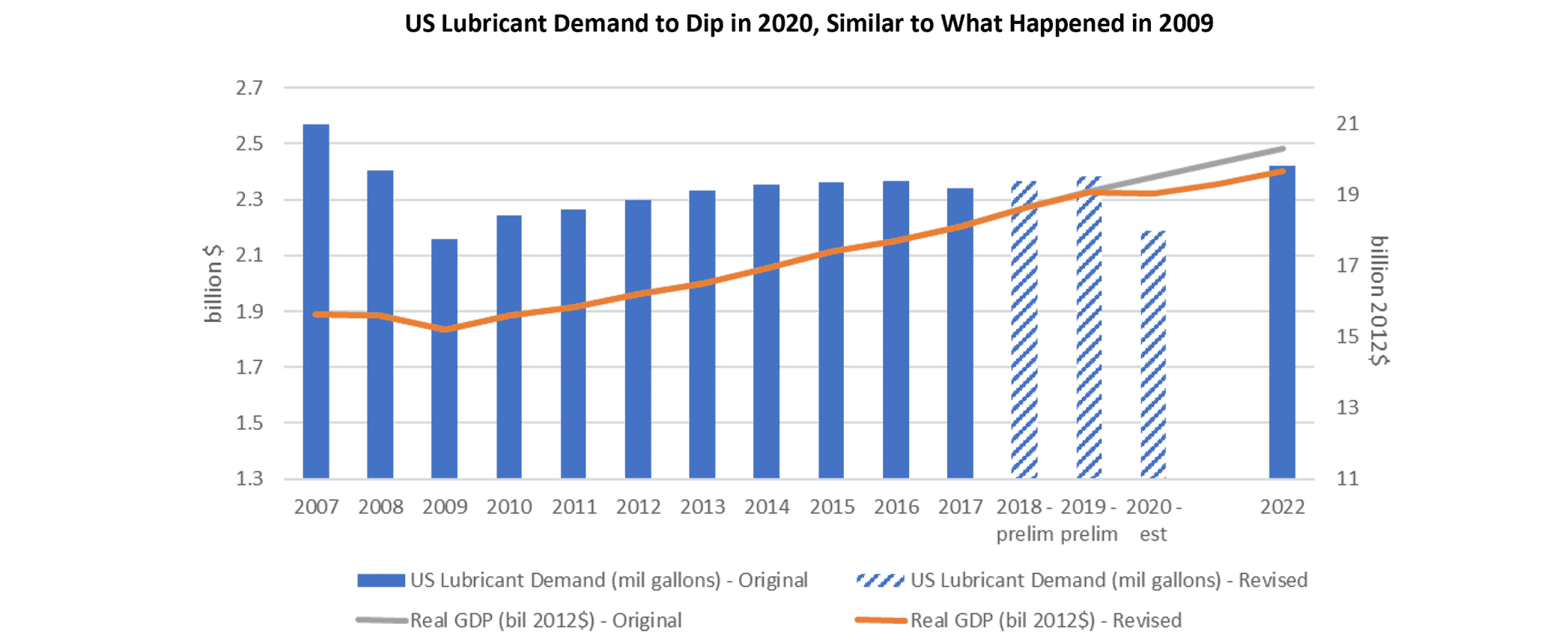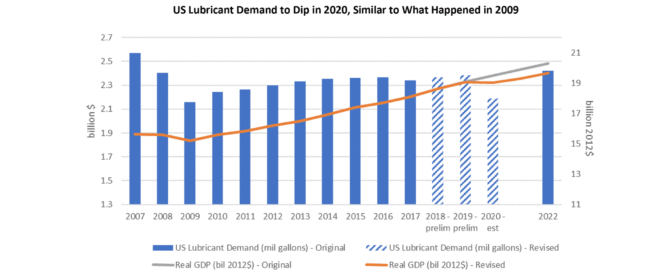
Industry observers believe the Covid-19 pandemic could reduce lubricant demand at least as much as the Great Recession of 2008 did, though they expect the global crisis to affect some product categories more than others.
Analysts added, though, that it is still early to forecast effects, and that the impact could be greater depending on how long it takes economies to recover from stay-at-home orders and business closings.
“As industries either shut down or limit production, demand is obviously reduced,” K&E Petroleum Consulting President Ernie Henderson told Lube Report. “With global demand estimated at 40 million tons, the impact of the coronavirus pandemic on demand is still evolving on a weekly basis. The severity will depend on when the world returns to normality, recognizing that like a big ship it will take time to ramp up the industry. This will further impact demand.”
Henderson estimated that lubricant demand in the United States could drop 20 percent this year. For context, analysts estimate the market shrank approximately 10 percent in 2009, the first full year of the 2008 recession. In 2008 and 2009 combined demand fell approximately 15 percent. In March, market research firm Freedonia predicted that U.S. lube demand will shrink by close to the same amount that it did in 2009.
Information provider IHS Markit released a report last week forecasting that worldwide lubricants consumption, excluding marine lubes, will decline 9.5 this year, compared to its estimate of a 7.2 drop for the global market in 2009.
Few individual companies have commented yet on effects on their own businesses. Brazil’s Cosan said last week that its lubricants sales were off by around 50 percent in recent weeks, both in Brazil and in other countries in which it operates.
Analysts and industry insiders agree that the pandemic and measures taken to contain it are impacting lubricants demand in several big ways. Stay-at-home orders have sharply reduced personal travel, which will slash aftermarket sales of passenger car engine oils – the largest single product category. Closings of businesses such as auto assembly plants has significantly reduced manufacturing activity and therefore demand for industrial lubricants. Air travel has dropped to a fraction of normal levels, sharply reducing lube demand from that industry.
IHS predicted that global demand for non-marine industrial lubes will fall just 3 percent in 2020, while it expects consumption of non-marine transport lubricants will decrease by 14 percent.
“[T]ransport sector lubricants consumption is expected to fall faster than transport fuels demand as economic pressures will lead many vehicle owners to delay oil changes, stretching drain intervals beyond usual levels,” the firm said.
The drop in finished lubricant demand will also reduce consumption of base stocks, including API Group I, II and III oils.
One area showing staying power is the heavy-duty diesel engine oil category, analysts said. Stephen Ames, managing director of SBA Consulting, explained that lube demand for commercial supply chains to essential industries still in operation is holding up well, especially retail operations such as Walmart and Costco, which have seen business surge, not to mention medical supply companies. Similarly the supply and deliveries of many on-line vendors, like Amazon, have kept demand for supply and delivery trucking operations strong.
Industry veterans agreed that the impact of Covid-19 will hurt but maintained that the industry has dealt with disruptions of this scale in the past – when crude oil prices collapsed in 1987, or a decade later in the wake of the Asian financial crisis.
There seems to be early consensus among analysts that the impact on the industry could start to ease off next quarter but that recovery will not happen fast.
“The worst of the demand fall-off is expected in the second quarter of 2020, with some limited recovery beginning in Q3,” Freedonia stated. “While usage rates are eventually expected to return to their pre-crisis levels, the rebound will be slow as the economic damage will take time to overcome.” Analysts agreed that the crisis may force some refineries to close, including some that include mineral base oil plants.
“This will benefit the global base oil industry that remains in an oversupply position, at least on paper with rated refinery capacities,” Henderson said recently. He also predicted an increase in mergers and acquisitions as inefficient operations are absorbed by larger, more efficient operations.

U.S. lubricants demand projections from Freedonia. Industry observers believe the Covid-19 pandemic could reduce lubricant demand at least as much as the Great Recession of 2008 did.